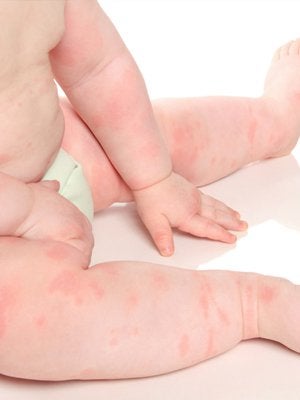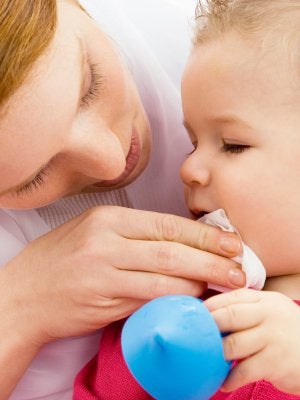
We believe breast milk is the best food for infants. When in consultation with their healthcare professional, mothers and families find that optimal breastfeeding is not possible due to their infant’s medical condition, formulas for special medical purposes play a vital role in providing essential nutrients to infants. We have a global commitment to market breast-milk substitutes responsibly.
This website is about the management of cows’ milk protein allergy and nutritional solutions intended for infants. By continuing on this website, you accept that Nestlé Health Science supplies the information at your own request.
Are you a healthcare professional (HCP) or a parent?
INCONSOLABLE CRYING
Crying is a normal part of the development for all infants within the first three months of life and it is their main way of communicating that they are hungry, tired, angry in pain or even bored.1,2
There is little consensus about the definition of an abnormal cry. The most widely used definition is “fussing or crying lasting for more than three hours per day, for more than three days, for at least one week.” 3,4 The incidence of an inconsolable cry is high in infants below three months of age and decreases considerably beyond six months of age.5 If an infant cries for more than three hours per day, for more than three days per week and for more than three weeks then they may be suffering from colic.2 (See Crying/Colic).
What causes inconsolable crying in infants?
Cow’s Milk Allergy (CMA) can cause inconsolable crying.6 Other possible causes include a urinary tract infection, gastro-oesophageal reflux disease (GORD), a viral illness and bacterial meningitis6 or colic3 (See Crying/Colic).
Inconsolable crying as a symptom of Cows' Milk Allergy
CMA can present with a number of clinical manifestations, which may result in symptoms, such as inconsolable crying.7
Signs and symptoms related to CMA
The majority of infants affected with CMA have at least two symptoms affecting at least two different organ systems.8,9
Having an awareness of the most common symptoms of CMA can help you to make an earlier diagnosis of CMA in your patients.

COMISSTM AWARENESS TOOL
The Cows' Milk-related Symptom Score (CoMiSSTM) is a simple, fast and easy-to-use awareness tool designed to help you more easily recognise the signs and symptoms that can be cows' milk-related in infants and young children.

If you suspect your patient is suffering from symptoms that may be suggestive of CMA, use the CoMiSSTM tool to score and assess the likelihood of CMA.
Other Symptoms of Cows' Milk Allergy
References
- Roberts DM., et al. Am Fam Physician. 2004;70:735–40
- Centre of Excellence for early child development. Crying Behaviour information sheet, 2008 (http://www.child-encyclopedia.com/crying-behaviour/resources) Accessed February 2016
- Wessel MA., et al. Pediatrics. 1954;14:421–35
- Zeskind PS. and Barr RG. Child Development. 1997;68:394–403
- Von Kries R., et al. Archi of Pediatr Adolesc Med. 2006;160:508–11
- Freedman SB., et al. Pediatrics. 2009;123:841–8
- Brill H. Can Fam Physician. 2008;54:1258–64
- Lifschitz C. and Szajewska H. Eur J Pediatr. 2015;174:141–50
- Høst A. Pediatr Allergy Immunol. 1994;5:1–36
IMPORTANT NOTICE: Mothers should be encouraged to continue breastfeeding even when their babies have cows' milk protein allergy. This usually requires qualified dietary counselling to completely exclude all sources of cows' milk protein from the mothers’ diet. If a decision to use a special formula intended for infants is taken, it is important to follow the instructions on the label. Unboiled water, unboiled bottles or incorrect dilution can make babies ill. Incorrect storage, handling, preparation and feeding can eventually lead to adverse effects on the health of babies. Formula for special medical purposes intended for infants must be used under medical supervision.
















